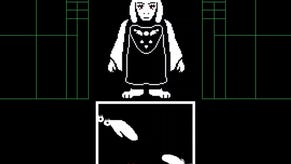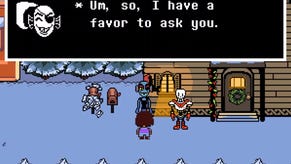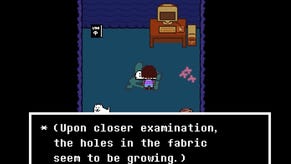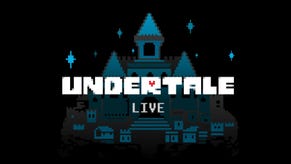Undertale review
Determined.
Undertale is a game all about endings, so it's fitting that its console release comes towards the tail-end of one particular piece of hardware's life. If this is a finale of sorts for Sony's PlayStation Vita, then it's a wonderfully apt one - there's something irresistible about the pairing of a handheld that became the home of a number of indie darlings and this, the indie phenomenon of the past few years.
It's to my absolute shame (and to Eurogamer's, which is mostly my fault) that Undertale was never reviewed on this site first time around. Back in 2015, I never found the half dozen hours in front of a PC that's required to see Undertale through (the wonderful Richard Cobbett did cover it for us after the fact, though, in an excellent piece I implore you to read after you've played the game), and maybe the rest of us were too busy enthralled in the sprawl of The Witcher 3, that year's other RPG. A shame, as Undertale belongs on equal billing with CD Projekt's masterpiece.
Consider this as some kind of penance, but also please accept my further apologies, because I'm not going to go into any real detail here. If, like me, the console version is your first experience with the game, you owe it to yourself to go in blind, because one of the big problems with Undertale is that it's hard to say too much about it - its pleasures lay in its surprises, its willingness to wrong-foot you and how its chorus of goofiness crescendos towards a climax that's desperately, beautifully sad. All I will say, and all you really need take away from this review, is the following: if you've any love for video games, or any interest in the stories they can tell, you should definitely play this.
Okay, I'll say a little more. Undertale dances happily in the footsteps of Shigesato Itoi's Mother series, and like those games before it it's a JRPG that's endlessly playful and inventive. Its overworld is linear and small but dense with characters and detail, its battle system a winning hybrid of turn-based combat and Touhou Project-inspired bullet hell. For all the battle system's intricacies and novelty, though, you're invited to skip it entirely, as Undertale's a game that goes out of its way to satisfy the curiosity of those who've asked if only you could talk to the monsters.
I'm getting caught up on the specifics, though, which you should discover for yourself. What sets Undertale apart - and what allows it to step out of Mother's shadow and walk happily alongside it - is its spirit. The work of essentially one person - Toby Fox, the shockingly young and offensively talented programmer and composer who prior to Undertale had contributed to MS Paint Adventure's Homestuck, a webcomic once delightfully dubbed by PBS as The Ulysses of the Internet - there's a spark to Undertale you rarely find elsewhere.
Indie's an overused and often abused term, but it fits perfectly here. Undertale has the erratic energy of a zine, the sincerity of a scratchy garage band 7-inch and the warmth and character of a hand-drawn comic strip. It's the kind of thing that only an outsider, with their fresh perspectives and willingness to work outside the lines, could do - which puts Fox in good company with Itoi himself, really. And like Itoi's Mother series before it, it's a work that's winningly, touchingly and uniquely human.
That humanity's in the writing, in the characters you meet, but it's also in the structure of Undertale itself. This is a game that rewards repeat visits, one that invites you to engage in conversation with it over time until it gives up some of its secrets - until you chip away at that comic facade and find the melancholy tenderness of a broken heart, or maybe something far worse. It's the writing that first gets you hooked on Undertale - over time, it's the deeper design that'll likely wow you. Going back to Undertale to unearth its hidden treasures is like going back to visit a friend, and it's no wonder it's regarded with such warmth by so many.
It's far from a perfect game - Fox once self-deprecatingly described it as an 8/10, and that's just about spot on, with pacing issues and a lack of thought placed into some of the encounters dragging it down - but it is near enough required playing. On Sony's Vita (it's worth noting that it's also available on PlayStation 4, with cross-buy part of the package), it nestles alongside contemporary classics such as Spelunky, TxK, Hotline Miami and Proteus and cements the cult status of this much-loved, ill-starred handheld. Heck, it may well be the best of the lot.



















